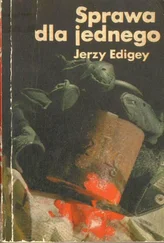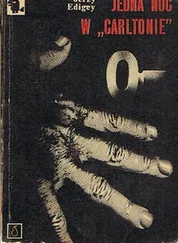Mother also told how, exactly a week before his death — exactly a week, since he died on a Wednesday, and that was also a Wednesday — Father first saw Mr. Trąba off as far as the gate, which was strange in itself, since he did that very rarely. And he didn’t return for the longest time. He walked around the garden, examined the apple and plum trees, touched an old cherry tree, bent over, as if he were picking something up from the grass, and then he dawdled about the house, until Mother got irritated that he was dawdling and dawdling — didn’t that bother him, she wondered? But then he went up into the attic, down to the basement, wandered through all the rooms, rummaged about as if he were looking for something, but really he was saying goodbye, just saying goodbye to everything.
And Bryś the Man-Eater, I suddenly recalled, do you remember how Bryś the Man-Eater fled from him? That was about a month earlier, six weeks before his death. Of course, Mother said, the first signs always appear six weeks before someone’s death. Commandant Jeremiah was taking Bryś on a walk. They stopped by our gate. They didn’t even come inside. Mother exchanged some meaningless pleasantries about the weather with the Commandant. Bryś the Man-Eater obediently crouched by his leg. But as soon as he saw Father standing on the porch he began to howl desperately and heart-wrenchingly, and he rushed into awkward, disorderly flight. We laughed at him, that he’d completely gone off his head in his old age. The oldest dog in the world (after all, as the Commandant explained, he is fifty years old) has a right to stranger whims than that. We laughed at the moribund old geezer, but he knew what he was doing. He howled, and he tried so desperately to flee, as if he felt the unearthly smell of death coming from Father, as as if he saw that somebody invisible was standing next to Father, someone who strikes fear into all creation.
In silence, in complete silence, without a word, Mother showed me Father’s watch, which she had taken off his wrist. The watch had stopped precisely with his last breath at 3:20. And then she showed me her watch, the hands of which had also stopped at 3:20, and then she pointed to both second-hands, both equally and identically immobilized on the 12, and then she recalled that in the last week of his life Father had gotten it into his head that he had to go to Warsaw on some urgent business. She was at wit’s end. He insisted furiously, as if something had taken possession of him. Finally she was able to convince him, and he stayed home. He stayed, and he died at home. That too, after all, is a sign of God’s grace, for, be that as it may, at least he didn’t keel over somewhere out in the world.
And so, we reminded each other of signs, and we made signs. We investigated whether Father’s death was accidental, whether it was inevitable, whether it was foreordained, or whether he was to blame for it, whether he could have avoided it, and whether he had wanted to avoid it, or whether, on the contrary, he had consciously gone to meet it. We placed question marks, and we summoned for help the watch hand, the fleeing dog, and all the objects that the deceased had touched. We attempted to penetrate the darkness. We did all that, and yet, after all, we also knew that he had long suffered serious heart problems, and that a year before he died the doctors had given him at most a year to live.
•
Ambulance. In Father and Mr. Trąba’s conversations, the word “ambulance” appeared very frequently. It appeared so frequently and persistently that the game of foreseeing its constant presence was boring and sterile. “No problem for me, I’ll take the ambulance,” Father would say. “I’ll send that by the ambulance,” “The ambulance will take us there,” “Everything we need can be put on the ambulance.” Ambulance, ambulance, ambulance — I pondered the movement, darkness, and roundness of that word, and I sensed the smell of wax seals. Then, imperceptibly, “ambulance” disappeared from our household, perhaps it disappeared entirely from the Polish language. With all certainty, in none of the hundreds of thousands, and perhaps millions, of sentences I have read in the meantime has the word ambulance appeared. I would have noticed it without fail and with all intensity, just as right away, with Proustian, madeleine-inspired intensity, I noticed it in Father’s posthumous papers. I was looking through those yellowed petitions to the Ministry of Communication and the District Office of the Post and Telecommunications. I read the dim typescripts Father had laboriously tapped out on the old English “Everest” typewriter. I read accusations and notifications of the initiation of proceedings printed on the official forms of the District Office of the Post and Telecommunications.
Disciplinary proceedings have been initiated against you on account of your infringement of official responsibilities, whereby, while employed in the position of Chief of an Office of the Post and Telecommunications, over the course of the year 1959 you exploited your position and sent private packages containing veal by postal ambulance, and at the same time you prevailed upon the personnel to transport those packages to the addresses of certain employees of the District Office of the Post and Telecommunications.
I read findings of punishment, composed with no little stylistic virtuosity, and comprehensive justifications for the findings of punishment.
Since the above-cited proofs confirm irrefutably the commission by the accused of the deeds mentioned in the content of the accusation, to wit: the sending of private packages containing veal by postal ambulance, and the pressure put upon the personnel of the ambulances to transport said packages, I recommend the administration of severe disciplinary punishment. Disciplinary Spokesman for the District Office of the Post and Telecommunication, Okoński, M.A.
With an aching heart, my throat choking up, I deciphered barely legible copies of desperate explanatory letters and plaintive petitions. I read applications and negative replies to applications, requests and interventions and negative replies to requests and interventions. Line by line I studied that black-and-white record of Father’s dialogue with a Postal Service that was as vast as nothingness.
I explain as follows: In the year 1959, in the area of Katowice, there occurred a passing, although serious, lack of meat products, above all veal. In view of this, knowing that, in the area of Wisła and its neighboring Istebna, there existed the possibility of acquiring veal, some employees of the District Office of the Post and Telecommunications in Katowice turned to me with the request that I buy meat and send it to them by the ambulance. I saw to this matter as a courtesy and without personal profit. I turn to you with the humble request for intervention in the matter of my removal from the position of Chief of the OPT and prejudicial transferal to the OPT in Cieszyn.
In reference to your letter, the District Office of the Post and Telecommunications informs you that, regarding the initiation of disciplinary action against you in the matter of the transportation by postal ambulance of private packages containing veal, the decision to transfer you remains in effect.
In view of the above, I once again ask for help and intervention. In view of my illness, the commute to work of nearly three hours in each direction is unusually onerous, and in winter practically impossible.
Regarding your letter concerning the matter of the prejudicial transferal, a final answer will be conveyed to you at a later date.
This is to inform you that your request concerning the granting of a two-month unpaid leave is postponed until the disciplinary hearing has taken place.
Читать дальше












